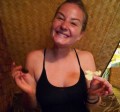“Rihanna?†says the café-au-lait colored face in Sihanoukville, her eyelids blinking rapidly in excitement. “Rihanna?†she asks again. I spin the wheel of my iPod and select “Umbrella,†a favorite. Min smiles broadly, and although she’s wearing the headphones, I can hear the faint thump of the bass line. She sings along, a series of unintelligible grunts phonetically corresponding to the lyrics. Her sister, Mow, sits next to me peeling a mango with the dexterity of a Michelin-rated chef.
I had met the girls earlier that week, sitting on the beach. The sand was littered with plastic bags and glass bottles brought in by the tide. Lounge chairs, aligned in neat rows, cover the area, and persistent vendors endlessly troll the shore selling massages, hair removal, sarongs, and a wide variety of snacks. Mow had been balancing a circular, wicker platter covered with tropical fruits on her head. Min, the younger of the two, carried a similar platter filled with small bags of chips and dried fruit. “Mango, pineapple, dragon fruit,†Mow called out in an endless refrain.  I waved her over. Like most of the fruit vendors on the beach, she sold peeled fruit for $1 or 4,000 riel (a currency so devalued that at one point I held 19 bills in my hand and even that did not equal one US dollar). I chose a mango, and my traveling companion a pineapple. Mow peeled the fruits, accepted our money, and then turned to us and gruffly said “you buy only from me. Promise!â€Â She glared at us and held out her pinky finger in a gesture of good faith. I looped it with my own finger and shook, swearing our allegiance.
At first the girls come to our loungers only in the morning and the late afternoon. But soon, they visit us three or four times each day. Min, who says she is ten but looks no older than eight and has the undeveloped beauty that prompts women like my mother to comment “she’s going to be trouble, this one,†likes to play with my hair and touch my skin. She is fascinated by my birthmark. If I wear my red bathing suit, the one with metal buckles, she touches the metal longingly and asks “is it real?â€Â I laugh, knowing she means gold, and tell her no. Mow, two years older than her sister, is darker with large white teeth that remind me of square pieces of Chiclet gum. She is indisputably the leader of their duo. She grabs Min by the arm if she whines, and alerts her in harsh Khmer when it is time to leave.
Gradually, the girls become more comfortable around us. We don’t understand it; we buy only two pieces of fruit each day, and speak only a handful of Khmer phrases. But the girls enjoy our company. They are fascinated by our painted nails, our brightly colored beach bags, our small felt coin purses. At times, they treat us like children. Once, Mow touched my leg, made a disgruntled ‘tsk’ noise, and began to thread my thigh, a technique that uses a thread to pluck the hair out at its root.  She lost interest after a few minutes, and I shaved that evening, embarrassed. Other times, the girls warn us not to be too trusting, pointing to a group of boys on the beach and saying, “those boys bad! They steal!â€
At ages ten and twelve, they work a full day, use sharp knives, and carry lighters. I rarely see them with adults. And though large billboards in the town center warn me to “stop child prostitution†and assure me that it is illegal, the billboards also prove that it is prevalent. Everyday, we ask the girls, “did you go to school today?†and everyday the girls answer “yes, we go in the afternoon,†or “yes, we go in the morning.â€Â But we never believe them. On afternoons, we see the girls playing in the surf, dressed in one of the two outfits they alternate between. In the mornings, we see them walking the beach, Mow endlessly calling out her wares.
One day, they introduced us to their family: four children and an older woman. I recognized the woman; she is one of the four or five beggars that regularly walk the beach. The girls explain that the children are their cousins, and the woman is their aunty. Their mother, they say, is in Phnom Penh. The children sit on the sand surrounding the loungers, and the aunty rests on the end of my lounger. We make stilted conversation in broken English and Khmer. The girls seem nervous, restless. I too am uneasy and I wonder about the meaning of this introduction. After a few minutes, the older woman slowly stands and beckons the children to follow her. Mow and Min wave goodbye, but leave behind a small girl, no older than three. The girl’s teeth have rotted, so that only small broken brown stumps poke out from her gums. The girl stares down the beach holding onto my lounger. She wears only underwear and a thin, white t-shirt. We offer her pieces of mango, while she looks longingly down the beach. “Are we babysitting her?†I wonder nervously. Soon, she totters off. We follow her, uncertain of our role in her care, but she disappears between a gap in beach restaurants. A gap where we are certain we aren’t welcome. We return, dejected, to our loungers and wonder what this experience means.
We leave Sihanoukville, after 18 days, our visas due to expire, and our friends waiting for us in Bangkok. We stayed too long anyway; a few days of rest morphed into weeks forming a tenuous friendship with girls who will probably forgot us in a week’s time. There is little to say to Mow and Min. We will probably never see them again.
Months later, my mother will ask if I have their address, if I want to send them a package. I will laugh at the absurdity of this question. But I will think of them often, wondering if they are still walking the beach calling out “mango, pineapple, dragon fruit,†still making pinky promises with other travelers. The answer scares me.

